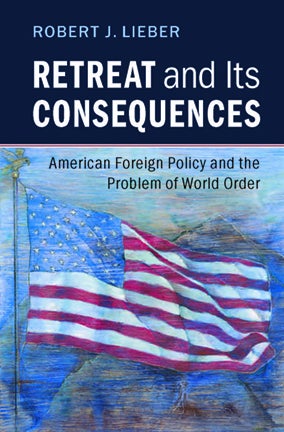Title: New Book Says America Losing Its Credibility in the World
Professor Robert Lieber’s new book argues that under the current administration, America has pulled back from its long-time role of international leadership, and in doing so antagonized its friends and emboldened its foes.
Under the Obama administration, America has pulled back from its long-time role of international leadership, and in doing so has antagonized its friends and emboldened its foes, according to a new book by Georgetown government professor Robert Lieber.

In
In Retreat and Its Consequences: American Foreign Policy and the Problem of World Order (Cambridge University Press, 2016), Lieber argues that Obama has been “indifferent” to allies and “conciliatory” toward adversaries, resulting in a loss of American credibility in the world.
“To the extent that there was an Obama doctrine, it was that we needed to pull back from many of our more active engagements abroad, and that doing so would remove a major cause of foreign antagonism toward the U.S.,” Lieber says, “So the president offered an extended hand to countries such as China and Russia and Iran and Venezuela and Cuba, in the belief that if we showed we had good intentions things would change.”
“The problem was that that view wrongly attributed causation mainly to us rather than taking into account the internal motivators of policy, belief and action on the part of those countries,” he adds.
‘Experiment in Retrenchment’
The professor says Obama has undervalued the impact of these leaders’ own internal histories, ideology domestic interests, beliefs, preferences and viewpoints. “I think he was giving insufficient attention to that,” he says. “So the last seven-and-a-half years have been a costly experiment in retrenchment, withdrawal and inaction.”

While he notes that Obama has actively used drones and Special Forces for attacks on ISIS and Al-Qaeda, “by and large the U.S. foreign policy has been one of retrenchment.”
As a result, concerns about the recession of American power have become widespread among friendly countries in the Middle East, Europe and Asia, he says.
Sending a Signal
Lieber gives a number of examples in the book, including Obama’s statement in 2012 that if it was discovered that Syrian President Bashir Al-Assad had used chemical weapons against his own people that would be a “red line for us.”
“When the president of the United States sets out a commitment like that, it has agreat deal of meaning,” Lieber says. “It sends a signal to enemies and allies.
“Obama made a statement that he was going to take action and then ultimately backed off,” he adds.“That signaled that the U.S. was not standing by its word – it signaled fecklessness, indecision and unwillingness to stand by its commitments, and it harmed American credibility.”
World View
Another example of Obama’s foreign policy lies in the reaction to Russia’s attack on Ukraine in 2014, he says.
“Ukrainians desperately appealed to the U.S. for defensive weapons, for things like night vision goggles, body armor, and communications gear so they could communicate without the Russians intercepting their phone calls,” explains Lieber, author of eight other books on foreign policy, “The first response of the administration was to give the Ukrainians 300,000 meals ready to eat.”
He notes that both military and civilian leaders, including presidential candidate and former Secretary of State Hillary Clinton and former Secretaries of Defense Robert Gates and Leon Panetta, have expressed comparable concerns about the current administration’s foreign policy decisions.
“Obama arrived in the White House with a world view that was shaped by a kind of academic, chattering class, faculty lounge atmosphere, and he had not much if any experience in foreign affairs,” the professor says. “He came to office with certain fixed ideas about the world and those ideas haven’t worked.”
Policy Choices
“All too often he has framed America’s policy choices as those of relative inaction or war,” Lieber adds. “But the range of options is far wider and includes diplomatic, economic, technological, symbolic, overt and covert means of exercising American power. The combination of power and diplomacy can be far more effective than when either is employed alone.”
With the 2016 election looming, Lieber has advice for the future leader of America.
“The next president needs to work with Congress and the public in reestablishing a more active, engaged American role in world affairs, recognizing that it’s in our national interest and that of a more stable, rule-based international order,” he says. “If we want a prosperous international economy, if we want to encourage democracy, liberty and the rule of law, if we desire regional stability, if we prefer that ISIS and Al Qaeda not make further advances, if we want to create disincentives for countries like Iran, Russia and China to dominate their regions and oppress their neighbors, we need a more robust U.S. role.”